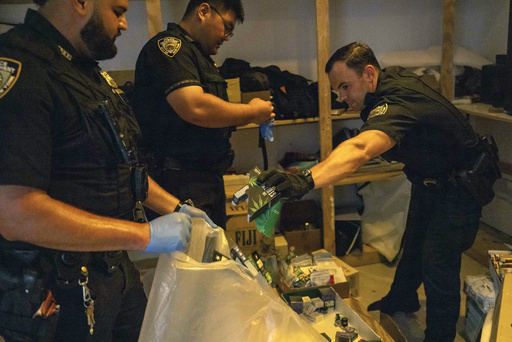A recent court ruling has declared a law used by New York City to shut down numerous suspected unlicensed marijuana shops as unconstitutional, asserting that it infringes upon the rights of business owners. The administration of Mayor Eric Adams is responding by swiftly launching an appeal, emphasizing that the city has effectively closed over 1,200 illegal establishments during its crackdown on the proliferation of unlicensed stores following the legalization of recreational cannabis in the state.
The decision arose from a case involving a business in Queens that was padlocked in September after an inspection by the sheriff’s office uncovered cannabis and related products being sold without a license. Earlier this year, new powers were enacted in the state budget, granting local authorities the ability to inspect suspected illegal shops and to shut them down immediately while administrative hearings are ongoing. However, the final decision rests with the sheriff’s department, allowing them to maintain a store’s closure even if an administrative hearing officer suggests otherwise.
This situation occurred in the Queens case, leading Judge Kevin Kerrigan to express concerns about the effectiveness of these administrative hearings, labeling them as “useless, or even a potential farce.” He pointed out that if the sheriff retains the ultimate authority to disregard hearing outcomes, there is no genuine opportunity for the store owners to present their case, subsequently heightening the chances of wrongful deprivation of their rights and raising substantial due process issues.
A representative for Mayor Adams, Liz Garcia, confirmed that a notice of appeal has already been filed by the city’s law department. “Illegal smoke shops and their dangerous products threaten the health of young New Yorkers and undermine our overall quality of life. We remain committed to padlocking illicit storefronts in order to safeguard our communities from the hazards presented by these operators,” she stated in an email.
Attorney Lance Lazzaro anticipated that this ruling would enable all stores that had been shut down to reopen and pursue damages claims, including losses from business interruptions and reputational damage. “The damages could be enormous,” remarked Lazzaro, who represents the Queens business, Cloud Corner. His sentiments included criticism of the city’s handling of the situation, asserting, “The City of New York should feel ashamed for facilitating this process in the first place.”
During an administrative hearing that took place after Cloud Corner’s closure, the store owner argued that the sheriff’s inspection occurred when the establishment was closed and therefore not actively selling cannabis products. Although the hearing officer agreed with this assessment, the sheriff’s office chose to maintain the closure for an additional year, despite the dismissal of the summons.


